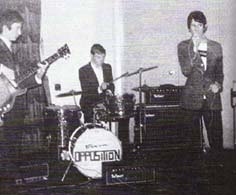The Early Years (5)
Written by Mark Hodkinson (OMUNIBUS PRESS)
*If you want to buy this book, go to Amazon.com!*

The Opposition in rehearsal with John on bass.
Chapter 1 : Clucksville (p.22--p.24)
In November 1967, after eight months in the group, Peter Bartholomew left The Opposition, though there were differing accounts of his exit, "Pedro showed off. I felt ashamed! Told him that he was leaving," was the terse entry in Richard Young's diary after a performance he considered too effusive for The Opposition. "I gave always been flamboyant," conceded Peter. "I like to have a laugh and I was a bit daft. I said daft things. I thought it was absolutely brilliant when we put flash guns under Richard's organ and things like that." Peter's version had him being tempted away to join his brother's band, The Rivals, a group with a busier social diary and a greater rhythm'n'blues edge. He did return briefly to The Opposition, however, when he had a three-month stint on saxophone a year or two later.
Peter Bartholomew drifted out of groups, working as a milkman and on motorway construction before forming his own business installing telephone systems. He sold the firm to a French company and is now self-employed again in the same business, proud of a full order book. He still has an organ and guitar and sings in karaokes when he's out with friends, but has no regrets about leaving the music business behind. "When I see a band, a good band, performing in a pub I sometimes get the itch again, but when I see them afterwards loading up the van in the cold on the car park, I'm glad I'm out of it. I couldn't be more happier with my life than I am now, couldn't enjoy it more."
He became a Queen fan, though it was some time before he realised his former musical colleague was a member: "I was such a fan of Queen and I never recognised him. I used to sit there night after night listening to the albums." It was only when John Deacon reverted to his original short haircut that Peter realised: "We were watching television. I think he was on Top Of The Pops or something. I said to my wife, 'Look who that is, it's John Deacon.' She said, 'So?', and I said, 'No, it's the John Deacon, from Oadby, from The Opposition...' 'Oh my God!' she said." After the initial shock, Peter realised he wasn't surprised by John's success: "He was the most talented in The Opposition, it was as if he had been born with a bass in his hand. He was always brilliant. He really deserved to get on. He was so relaxed when he played, always so confident."
Another member was Richard Frew who lasted just a month on guitar, before being replaced by the dextrous Ronald Chester. Ronald was an integral member, helping Richard Young with the band administration. For a month or two they were fronted by a singer called Carl, whose surname they forgot to log, but he left early in 1967. Whatever the line-up, The Opposition formed a merry crew as they drove through the hedge-flanked lanes of Leicestershire to another performance; arguments were rare and they had an unusual rapport. Sometimes the van would break down, venues would double book, amplifiers would explode, the band would bicker, someone would forget an effects pedal, the set list would change three songs in; this was John Deacon's musical apprenticeship and it was extraordinarily thorough.
Word got round that there was another band called The Opposition, so Oadby's Opposition became The New Opposition in April 1966, but then changed back again in January 1967. A few months later, on another whim, they became The Art, because, according to Richard Young, "Dave Williams was arty." They were all extremely young, so even by the summer of 1969 when John Deacon finally left, he was still a few months from his eighteenth birthday.
John Deacon played his final concert with The Art at Great Glen Youth and Sports Centre in August 1969, his place being taken immediately by another local musician, John Savage. John had been accepted on a course to study electronics at Chelsea College, an affiliate of London University. He had been with the group for four years, during which time they had played an average of one show each week. While it was invaluable experience in the grist of life in a pop group, it was irrefutably a small town enterprise. Two of their typically homespun comical episodes are again related best in the staccato style of diarist Richard: '26 September 1966 - Blackbird Motors Annual Dance, very dusty from the straw bales,' and 15 October 1966: 'Suddenly Deaks had pains in his stomach and had to play near the open window at the side of the stage for fear of being sick.'